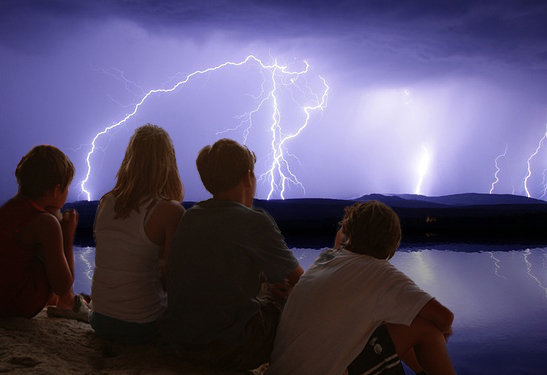I’ve become very familiar with Psalm 18 over the past few years. Though David in Psalm 18 was praying against human enemies (who were, of course, aiding the dark side by their actions), doesn’t it wonderfully depict daily battles—especially big battles—against THE enemy? I’ve prayed these words about personal situations and about the situations of others. And I’ve prayed it while asking the Lord to please make it become the prayer of a person I’m concerned about … that the person will realize that though he’s in “the snares of death” (v. 5), the Lord can immediately “thunder from heaven” to intervene (v. 13). And if the person being prayed for is an unbelieving friend, the prayer is indicating my hope that he will come to know the Lord in the powerful ways detailed in this passage and can soon voice these words as his own prayer.
I most often pray this psalm out loud, openly defying the dark side. I tend to picture the enemy shrinking into a corner, holding his ears, when the Lord’s Word is boldly declared. (Feel free to also play some strong Christian music as background.)
Look inside Psalm 18. Here is some guidance for each of the sections:
- Let verses 1-3 set the stage and acknowledge the Lord and his power.
- Use verses 4-6 to show the individual’s desperate trouble.
- Show bold confidence in the power of verses 7-8, which are full of special effects. The Lord trembles with rage at the dark attempts to destroy people, especially the Lord’s own. Gotta love this thundering!
- In verses 9-19 you can picture the victory you want for the person you’re praying for: more wild weather as the Lord swoops down in full battle rattle and rescues.
Sidebar: Note how some psalms begin with the speaker complaining to the Lord, but becoming hopeful and seeing the bigger picture by the end. When we do need to complain, mightn’t that method—going straight to the Lord—be more effective than raging/venting to a mixed bag on social media?
From the rest of the Psalm 18 chapter, you can choose portions that best relate to everyone involved in the situation at hand, and you can address key points.
- Verse 20 note: The “righteousness” here is not an arrogant sort of superiority from the original speaker (or from any believer praying this), not claiming to be perfect. It’s just the mindset/intention/attempt to stay aligned with the Lord, openly identifying as one who belongs to him.
- Verses 30-32. Whatever other verses of Psalm 18 are used, be sure to include these. They clearly show that it’s important to regroup/repent and to stay on the Lord’s perfect path, no matter what. Because “the word of the Lord is flawless.”
The whole emphasis of this passage reinforces my thinking that when we’re feeling overly pressed down, nervous, fearful, hopeless, agitated, powerless … we should—after a few moments of wallowing—rise up with an anger at what the REAL enemy is trying to do. He’s lurking. How might he try to take whatever is happening and use it against us? And if we wimp out and back down, couldn’t that also work against others whom we might have influenced for the Lord?
In other words, instead of getting too upset at the situation or the human agents of the trouble, what if we make ourselves think more big-picture. This is where accounts of Nehemiah, King Josiah, King Jehoshaphat, Daniel, and many others show us how to fight back, how to stand confidently on the Lord’s path with a positive mindset. The Lord’s power is available!
Psalm 18 can be used by a group or family that joins together in prayer. And hey, do you know any kids who are afraid of lightning and thunder? Psalm 18 sure puts a cool spin on that!



